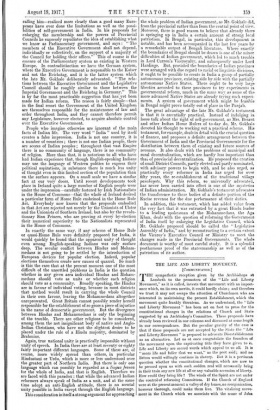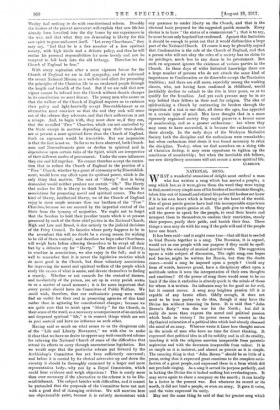T HE sympathetic reception given by the Archbishops at Lambeth to
the promoters of the "Life and Liberty Movement," as it is called, invests that movement with an import- ance which, on its own merits, it could hardly claim ; and therefore we trust it may not escape the attention of Churchmen who are interested in maintaining the present Establishment, which the movement quite frankly threatens. As we understand, the "Life and Liberty Movement" has been set on foot to press for the constitutional changes in the relations of Church and State suggested by an Archbishop's Committee. These proposals have already been reviewed in our columns and discussed at some length in our correspondence. But the peculiar gravity of the case is that if these proposals are not accepted by the State the "Life and Liberty Movement" is prepared to advocate Disestablishment as an alternative. Let us at once congratulate the founders of the movement upon the captivating title they have given to it. Life and Liberty arc sacred words which appeal to us all. It ia "more life and fuller that we want," as the poet said ; and no Briton would willingly continuo in slavery. But it is a pertinent question whether the constitutional changes, which are now to be pressed upon us with such sudden zeal will necessarily bring in their train any new life at all or any valuable accession of liberty. How could they bring life ? The winds of the Spirit are not under the control of reforming Committees. If the Church of England were at the present moment a valley of dry bones, no reorganization, however thorough, could make thorn live. Tho vitalizing move- ment in the Church which we associate with the name of John
Wesley had nothing to do with constitutional reform. Possibly the leaders of the present movement will explain that new life has already been breathed into the dry bones by our experiences in the war, and that what they are demanding is liberty for this now spirit to growand assert itself. "Let every Churchman," they may say, " feel that he is a free member of a free spiritual society, with high ideals and a definite policy, and then he will realize his personal responsibilities far more keenly and not be tempted to fall back into the old lethargy. Therefore let the Church of England be free."
With every aspiration after a more vigorous future for the Church of England we are in full sympathy, and we welcomed the recent National -Mission as a well-devised effort for presenting the principles of the Christian life to an awakened people through the length and breadth of the land. But if we are told that new vigour cannot be infused into the Church without drastic changes in its constitution we must demur. The young men who assure us that the welfare of the Church of England requires us to embrace their policy and light-heartedly accept Disestabliehment as an alternative must convince ue that the end they seek will come out of the scheme they advocate, and that their millennium is not a mirage. And, to begin with, they must show us, if they can, that the so-called "Free" Churches,-which are not controlled by the State except in matters depending upon their trust-deeds, are at present a more spiritual force than the Church of England. Such an argument would be irresistible. But our impression is that the fact isnot so. So far as we have observed, both Church- men and Nonconformists grow or decline in spiritual zeal in dependence upon certain tides of the Spirit, which are irrespective of their different modes of government. Under the same influences they rise and fall together. We cannot therefore accept the conten- tion that to reduce the Church of England to the position of a "Free " Church, whether bye, grant of autonomy or byDise.stablish- ment, would have any effect upon its spiritual power, which is the only thing that matters. The sort of " liberty " that is being demanded would neither produce nor sustain "life." The liberty that makes for life is liberty to think freely, and to combine in associations for promoting moral and spiritual causes. The first kind of liberty, intellectual liberty, we of the Church of England enjoy in more ample measure than our brethren of the "Free " Churches,because we are secured by the impartial control of the State from the tyranny of majorities. We ought not to forget that the freedom to hold their peculiar tenets which is at present possessed by each of the three chief parties in the National Church, High and Low and Broad, is due entirely to the judicial decisions of the Privy Council. To fanatics whose party happens to be in the ascendant this will no doubt be a strong reason for wishing to be rid of State control ; and therefore we hope sober Churchmen will weigh facts before allowing themselves to be swept off their feet by a delusive cry for "liberty." The other kind of liberty, to combine in associations, we also enjoy to the full; and it is well to remember that it is never the legislative societies which do most good in the Church, but those voluntary associations for improving the moral and spiritual welfare of the people which study the causes of what is amiss, and devote themselves to finding a remedy. Whether or not councils for the control of finance, and incidentally of the parson, are set up in every parish seems to us a matter of small moment ; it is far more important that every parish should have its Committee of Public Welfare. We could wish, therefore, that our enthusiastic young men would find an outlet for their zeal in promoting agencies of this kind rather than in agitating for constitutional changes ; because we are quite sure that to insist upon " liberty " for the Church, in their sense of the word, as a necessary accompaniment of an enriched and deepened spiritual "life," is to connect things which are not in pari materia and have no influence on each other.
Having said so much on what seems to us the dangerous side of the "Life and Liberty Movement," we wish also to make it clear that we have no desire to oppose any well-considered scheme for relieving the National Church- of -some of the difficulties that attend its efforts to carry through uncontentious legislation. But we would urge that the particular scheme put forward by the Archbishop's Committee has net been sufficiently canvassed; and before it is carried by its clerical advocates up and down the country it should be thoroughly examined by a larger and more representative body—why not by a Royal Commission, which could hear evidence and weigh objections ? This is surely more than ever necessary if the alternative to the scheme is to be Die* establishment. The subject bristles with difficulties, and it cannot be pretended that the proposals of the Committee have not met with a good deal of damaging criticism. We will mention here one objectionable point, because it is entirely inconsistent with
any pretence to confer liberty on the Church, and that is the electoral basis proposed for the suggested pariah councils. -Every elector is to have " the status of a communicant" ; that is to say, he must be not only baptized but confirmed. Against this limitation it should be enough to point out that it would disfranchise a largo part of the National Church. Of course it may be plausibly argued that Confirmation is the rule of the Church of England, and that a person who will not obey the rules of a society has no claim to its privileges, much less to any share in its government. But such an argument ignores the existence of various parties in the Church. In these days of wider historical knowledge there are a large number of persons who do not attach the same kind of importance to Confirmation as do thoeewho accept the Tractarian tradition ; and there are still more, especially among the working classes, who, not having been confirmed in childhood, would justifiably decline to submit to the rite in later years, so as to qualify for the franchise. And yet such persons may be in no way behind their fellows in their zeal for religion. The idea of spiritualizing a Church by contracting its borders through the imposition of a test is one that, all down the ages, has appealed to a certain type of mind. Men have thought that in a more rigorously organized society they could preserve a keener sense of membership, and so a greater enthusiasm : but where they may seem to have succeeded, it is became the enthusiasm was there already. In the early days of the Wesleyan Methodist Society both the discipline and the enthusiasm were remarkable; but when enthusiasm died down it was found necessary to relax the discipline. To-day, when we find ourselves ion a rising tide of Christian feeling, it may seem opportune to tighten up the eonditions of membership ; but when the inevitable ebb follows, our new disciplinary measures will not secure a more spiritual life.
Cutworm.



























 Previous page
Previous page